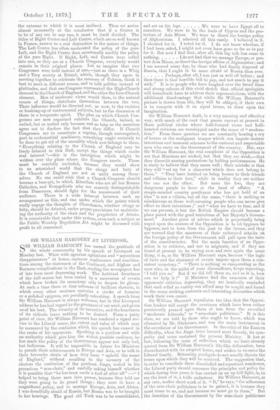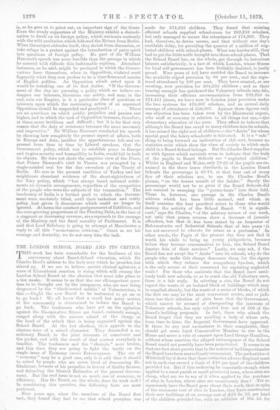SIR WILLIAM HARCOURT AT LIVERPOOL,
SIR WILLIAM HARCOURT has earned the gratitude of the whole community by his speech at Liverpool on Monday last. What with agrarian agitations and " mysterious disappearances" at home, ominous conferences and combina- tions among the statesmen of the Continent, and Afghan and Burmese complications in the East, reading the newspapers has of late been most depressing work. The habitual dreariness of the dull season has been varied by a succession of events which have broken its monotony only to deepen its gloom. At such a time three or four columns of brilliant rhetoric, in which every other sentence contains a stroke of humour or a polished epigram, are peculiarly refreshing. A. speech from Sir William Harcourt is always welcome, but in this Liverpool address he has had regard to the greatness of our need, and given i us of his best. The vivacity of its invective, and the heartiness of its ridicule leave nothing to be desired. From a party point of view, Sir William Harcourt has rendered a signal ser- vice to the Liberal cause, the extent and value of which may be measured by the confusion which his speech has caused in the ranks of his opponents. Speaking in a position and with an authority which give him the widest possible audience, he has made the policy of the Government appear not only bad, but ludicrous. It will be impossible in future for Ministers to parade their achievements in Europe and Asia, or to talk in their favourite strain of how they have " upheld the name of England," without recalling to the memory of the electors the confession of the penitent Jingo, seated in his precarious " arm-chair," and ruefully asking himself whether it is possible that "he has been made a fool of after all" :—" I helped to bring these men into power, because they told me they were going to do grand things ; they were to have a magnificent policy, and to manage Europe, Asia, and Africa. I was dreadfully afraid of Russia, but Russia was to be brought to her bearings. The good old Turk was to be consolidated,
and sot on his legs We were to have Egypt all to
ourselves. We were to be the lords of Cyprus and the pro- tectors of Asia Minor. We were to direct the foreign policy of Afghanistan. I admired all this vastly. I believed in it. I shouted for it. I voted for it. I do not know whether, if I had been asked, I might not even have gone so far as to pay for it. But now I find that, after all, this big talk has come to nothing. . , . . I do not find that we manage Europe, or pro- tect Asia Minor, or direct the foreign affairs of Afghanistan ; and I am 'assured every day, by those who had finally disposed of Russia, that I ought to be more afraid of Russia than ever.
Perhaps, after all, I was just as well off before ; and then there is that horrible bill to pay, and not much to pay it with." It is to people who have laughed over the broad lines and strong colours of this vivid sketch that official apologists will henceforth have to address their representations, with the additional disadvantage that while Sir William Harcourt's picture is drawn from life, they will be obliged, if their own is to compete with it on equal terms, to draw upon the imagination.
Sir William Harcourt dealt, in a very amusing and effective way, with much of the cant that passes current at present in those political circles where half-formed views and half- hearted criticism are worshipped under the name of " modera- tion." From these quarters we are constantly hearing a cry of horror at the malignant temper which can impute sinister intentions and immoral schemes to the eminent and respectable men who carry on the Government of the country. But, says Sir William Harcourt, the real complaint of the Opposition is not that Ministers are wicked, but that they are weak,—that they discredit soaring pretensions by halting performances. He is ready to believe that they mean well ; their mistake is that they will "set up for a character which does not belong to them." " They have insisted on being heroes to their friends and villains to their foes," while in reality they are neither the one nor the other. But none the less, they are
dangerous people to have at the head of affairs. 46.A.
simple-minded country gentleman who has got hold of an idea " is not a villain, but all the same, " there is nothing so mischievous as those well-meaning people who can never give effect to their intentions ;" and " what we have to fear, and if we can prevent, is lest the British Empire should become a place paved with the good intentions of her Majesty's Govern- ment." Another piece of advice which is perpetually being urged upon the orators of the Opposition is to let bygones be bygones, and to turn from the past to the future, and they are warned that the sameness of their reiterated attacks on the foreign policy of the Government will pall upon the taste of the constituencies. But the main function of an Oppo- sition is to criticise, and not to originate, and if they are found at present to be saying over and over again the same thing, it is, as Sir William Harcourt says, because "'the logic of facts and the obstinacy of events impose upon them a con- sistent monotony." " There is nothing so exasperating as the man who, in the midst of your discomfiture, keeps repeating, ' I told you so.' But if we did toll them so, and so it is, how can we help it ?" If Ministers find the sameness of their opponents' criticism depressing, they are ironically reminded that such relief as variety can afford may be sought and found in the many striking contrasts and interesting diversities which mark their own career.
Sir William Harcourt repudiates the idea that the Opposi- tion leaders will accept the overtures which have been rather persistently pressed upon them of late from the so-called " moderate Liberals," or " arm-chair politicians." It is this class, we are told by those who ought to know, which was alienated by Mr. Gladstone, and was the main instrument in the overthrow of his Government. In the crisis of the Eastern difficulty, when the Jingo fever burned most fiercely, its sym- pathy and votes sustained the present Ministry. It has at last, following the train of reflection which we have already quoted from Sir William Harcourt's life-like delineation, been disenchanted with its adopted home, and wishes to re-enter the Liberal family. Returning prodigals do not usually dictate the terms upon which they will be received. The suggestion' that, in order to conciliate these dissatisfied and repentant wanderers, the Liberal party should renounce the principles and policy for which during four years it has carried on an up-hill fight, is, to say the least of it, a trifle audacious. Sir William Harcourt, at any rate, makes short work of it. " If," he says, "the adherence of the arm-chair politicians is to be gained, it is because they must Come to us, and not because we must go to them." But the desertion of the Government by the arm-chair politicians is, as he goes on to point out, an important sign of the times. Even the steady supporters of the Ministry exhibit a disincli- nation to dwell on its foreign policy, which contrasts curiously with the wild exultation which followed the Return from Berlin. When the subjectobtrudes itself, they shrink from discussion, or take refuge in a protest against the introduction of party spirit into questions of foreign policy. No part of Sir William Harcourt's speech was more forcible than the passage. in which he covered with ridicule this fashionable sophism. Abundant instances, as he said, might be produced in which the Conser- vatives have themselves, when in Opposition, violated most flagrantly what they now profess to be a time-honoured maxim of English politics. An Opposition which acted upon it would be forsaking one of its first duties. "If the Govern- ment of the day are pursuing a policy which we believe en- dangers our interests, threatens our safety, and may, in the end, ruin our Empire, is it a particular class of questions or interests upon which the restraining action of an organised Opposition should be suspended and paralysed There are no questions on which public prejudice and passion run higher, and in which the task of Opposition becomes, therefore, at times more invidious and difficult ; but it is for that very reason that the duty of resistance becomes the more necessary and imperative." Sir William Harcourt concluded his speech by showing how completely the present aspect of affairs, both in Europe and Asia, justifies the apprehensions felt and ex- pressed from time to time by Liberal speakers, that the Government policy, which was to establish peace in Europe and to give security and tranquillity to India, would fail in both its objects. He does not share the sanguine view of the Times, that Prince Bismarck's visit to Vienna was prompted .by a single-minded zeal for the duo execution of the Treaty of Berlin. Ile sees in the present condition of Turkey and her neighbours abundant evidence of the short-sightedness of the Tory policy, which " has always based national settle- ments on dynastic arrangements, regardless of the sympathies of the people who wore the subjects of the transaction." The insolvency of India is a further peril to which tho Govern- ment were resolutely blind, until their turbulent and costly policy had given it dimensions which could no longer be ignored. At home the constant postponement of liabilities, and the ever-growing proportions of the Floating Debt, in the face of a stagnant or decreasing revenue, are areproabh to the courage of the Ministry and the fiscal morality of Parliament. It is said that Lord Salisbury is going to attempt at Manchester a, reply to all this " monotonous criticism." Great as are his courage and dexterity, we' do not envy him the teals.

































 Previous page
Previous page